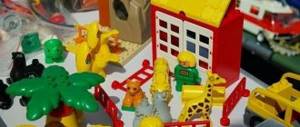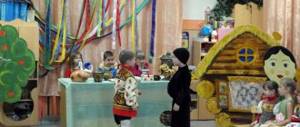Concept of daily routine
The daily routine is a measured and consistent routine for the whole day.
For the upbringing and development of a harmonious personality, the child’s living conditions, namely a rational daily routine, are of great importance. When drawing up a daily routine for a preschool child, it is first necessary to take into account the child’s age, his needs for nutrition, sleep, play and educational activities, etc. If the daily routine within the family provides only a sequential schedule of routine moments during the day, then within the preschool educational institution, teachers are not limited to this. Each regime moment has a specific content and purpose. The daily routine in a preschool educational institution is aimed at improving the health and formation of the child’s personality and its characteristics, such as accuracy, independence, responsibility, etc.
Finished works on a similar topic
- Course work Daily routine, its importance in raising children 480 rub.
- Abstract Daily routine, its importance in raising children 270 rub.
- Test work: Daily routine, its importance in raising children 190 rub.
Receive completed work or specialist advice on your educational project Find out the cost
The importance of the daily routine lies in the fact that its correct and precise observance contributes to the normal functioning of the child’s body, ensures productivity, and forms adaptability and resistance to the influence of negative factors.
The physiological basis of the daily routine consists of the correct regularity and frequency of life processes.
A child who has an established daily routine from birth is calmer, falls asleep and wakes up easier, is cheerful and cheerful during the day. Every routine moment turns into a ritual over time. As you know, children, especially preschool children and newborns, have a hard time with changes in their lifestyle. That is why the daily routine is so important for them. Children already know that one routine moment will be followed by another, they form the necessary attitude, and therefore they are calm and balanced, unlike children who do not have a daily routine and live according to their immediate needs.
Note 1
Thus, a properly organized daily routine promotes optimal excitability of the central nervous system and has a beneficial effect on its performance and the child’s emotional mood.
Too lazy to read?
Ask a question to the experts and get an answer within 15 minutes!
Ask a Question
One day in kindergarten, rough plan
Most preschool institutions work twelve hours (from 7.00 to 19.00). The daily routine in the kindergarten is drawn up accordingly: starting at seven in the morning, children are received, ending with them going home at seven in the evening.
- Morning. In the morning, the teacher receives children, conducts exercises and organized educational activities (classes) with them. Children also have breakfast in the morning, and in their free time they can play or chat with other children.
- Reception of children. The day begins with the teacher receiving the children from their parents. Here it is important to create a positive emotional mood among the guys in the entire group. When a teacher receives a child, he is interested in his state of health and can also answer some questions from parents.
- Morning work-out. In order to give children a boost of energy for the whole day, exercises are included in the kindergarten schedule in the morning, which involves a number of specific physical exercises. Daily exercises help strengthen the musculoskeletal system of children, making them more resilient and healthy. Exercises can be carried out either by the teacher himself or by a physical education worker. Usually, morning exercises are performed with musical accompaniment in the gym for physical education classes (except for nursery and junior groups).
- Breakfast. The daily routine in preschool educational institutions strictly regulates the time children eat, in particular, breakfast.
- Classes (educational activities). The teacher conducts classes in a playful way so that the children better understand the material. The duration of classes varies in different groups, taking into account the age of the children. On average they last from 10 to 25 minutes.
The daily routine of the kindergarten includes the following types of activities:
- cognitive development,
- mathematical development,
- speech development,
- familiarization with fiction,
- productive activities (modeling, design, appliqué),
- creative activity,
- music,
- Physical Culture.
- Day. The daily schedule of the kindergarten includes a walk, lunch and nap.
- The kindergarten routine certainly includes a daytime walk for children. It promotes children's health, hardening, development of movements and their general cognitive development. Usually, walks in kindergarten are carried out in any weather. The reasons for its cancellation are strong gusts of wind, heavy rain, heavy snowfall and blizzards, severe frost, etc. During drizzling rain and light snowfall, children walk on the verandas, which are specially provided for this purpose. In different age groups, the walk lasts its own specific time.
- After the walk, the children have lunch. In order to restore energy after cognitive and active activity, the child is offered to eat a full lunch, which consists of salad, first, second and third courses.
- Preschool children simply need daytime sleep, so it must be included in the daily routine in kindergarten. The duration of sleep depends on the age of the children. Typically, daytime sleep lasts from one and a half to three hours.
- Evening. Evening is considered to be the time after bedtime and before the children go home. During these hours, children have more time for independent play activities, and the teacher can carve out a few minutes for individual work with this or that child.
- After the children wake up, they go to lunch. This is a light snack that will help your child not feel hungry until dinner.
- For older children (senior and preparatory groups), an additional walk is included in the kindergarten schedule after afternoon tea.
- Educational activities are also provided in the evening. Classes are held in groups of younger and middle age. It could be modeling or drawing, music or physical education. In the evening, children are given more time for independent activities, role-playing or board games.
- Around five o'clock in the evening, the children sit down to dinner, and after that they begin to be taken home.
The importance of each regime process in raising children
In raising a child, a properly organized daily routine is of great importance, namely the optimal and organic sequence of routine moments.
The importance of routine moments in raising a child:
- Morning exercises.
The main goal of morning exercises is to “wake up” the child’s body, give him a boost of energy, and set him up for work. Gymnastics has a positive effect on the muscular system, activates the activity of body systems and the functioning of internal organs. With daily gymnastics, children develop the habit and need for physical exercise in the morning. That is, morning exercises are of great importance for the physical education of children.
- Dream.
During sleep, the child has the opportunity to restore not only his physical strength, but also relax his nervous system and calm down. Daytime naps keep your child active in the afternoon. With age, children's need for daytime sleep goes away; they are able to do without it. However, it is necessary to properly organize night sleep, namely going to sleep, its duration, the child’s sleeping place, and awakening.
- Hardening.
One of the important regime elements is hardening. Hardening is understood as increasing the body's resistance to external influences. Hardening of the child must begin from birth, using gentle methods (air baths, pouring cool water on the legs while bathing, etc.). Hardening can be carried out as an independent routine moment (pouring water, specially organized air baths, etc.), or it can be done as part of another routine moment (for example, during daytime sleep, children sleep with open windows, without drafts).
- Eating.
An obligatory element of the daily regimen is the child’s nutrition, which consists of several meals at set intervals and in set quantities. Strict adherence to food intake contributes to its digestibility and the formation of a healthy appetite in the child.
- Walk.
Helps improve the child's health, since a walk in the fresh air has a positive effect on metabolism, increases appetite, and also helps to strengthen the child's body. In addition, during a walk, a child can maximally satisfy his needs for movement, communication with peers during joint games, research activities, etc.
- Classes (GCD).
ECD is one of the main forms of educational activity for children; it contributes to the comprehensive development of children, satisfies their needs for new knowledge, and develops cognitive abilities. A properly organized learning process contributes to the normal mental and physical development of the child. Also, the overall level of children’s development largely depends on the GCD and how it is organized.
- A game.
A child's play is the leading form of activity in preschool childhood. In addition to its educational and educational value, play, primarily outdoor play, is also an important means of promoting health.
Daily routine in kindergarten for younger and older children
The daily routine in kindergarten differs for younger and older children. Teachers of younger groups pay more attention to the development of cultural and hygienic skills than directly to educational activities. The classes themselves are shorter here, lasting 10-15 minutes. The teacher conducts the lesson in subgroups. Children's walks are shorter in duration because a lot of time is spent on the process of dressing and undressing. Because of this, there are no walks for small children in the evening.
As children age, not only the difficulty of the activity increases, but also its duration. Therefore, there is less time for daytime sleep, and walking, on the contrary, increases.
Organizing a daily routine in a preschool educational institution is important for children. Parents should know how their child’s day is planned in kindergarten, and try to adhere to this schedule at home.
Daily routine in kindergarten
MAGAZINE Preschooler.RF
Consultation for parents “Your child’s daily routine”MUNICIPAL PRESCHOOL EDUCATIONAL INSTITUTION "KINDERGARTEN "ROSINKA" NADYM" (MDOU "KINDERGARTEN "ROSINKA" )
Physical education instructor Nafisa Imamovna Kamasheva
Daily routine in kindergarten, school, at home... What is a routine and why is it needed?
A regime is a routine established for the correct alternation of wakefulness, sleep, eating, walking, playing, etc. Everything should have its own time. A child who lives according to a routine is healthier and calmer than one who does not live according to the routine established for his age. Parents should contact the health workers at the kindergarten their child attends and ask them for the recommended daily routine for their child. One very important tactical point: do not create a daily routine at your own discretion - always together with the child, in consultation with him, taking into account his wishes. Start by agreeing on an approximate daily routine for the child and all family members, so that everyone has the opportunity to take turns monitoring its implementation. When drawing up a daily routine, do not forget to take into account the distance that the child has to walk from school to home every day, the children’s social workload and extracurricular interests, housework, physical education and sports.
Instilling healthy habits in a child has enormous hygienic value: with their help, greater savings in energy, better adaptation to environmental influences, and a high level of performance are achieved. All this speaks in favor of establishing a clear daily routine for the child. If children are not accustomed to order and a strict regime, then they grow up irritable, capricious, with a very unbalanced nervous system. With their endless whims, they inflate themselves and unbalance their parents. The child must get up and go to bed at a certain time, have breakfast, lunch and dinner. Noisy outdoor games should be replaced by calmer ones.
When creating a schedule, you must first of all focus on the child’s age, level of development, state of health and living conditions in which you live. If the regime is followed, children develop correctly. During the day, specific time must be allocated for gymnastics, a set of hardening procedures, and walks in the fresh air. You should walk with your children at any time of the year and in any weather. This will harden them well and make them more resistant to colds. The regime can only be violated if the child is ill. A child’s health consists of four main components of a lifestyle: physical activity, hardening, nutrition and psychological comfort.
In organizing a healthy lifestyle, sleep occupies an important place, which is of great importance for the normal development and health of the child, no less than nutrition. Only during sleep does the nervous system receive complete rest and the functionality of nerve cells is restored. The child should sleep in silence and on a comfortable bed. The child's bed should not be too soft and the pillow should not be high.
Incorrect desk position and insufficient lighting can lead to the development of myopia. It is necessary to ensure that the light, when the child writes, draws, reads, falls on the table from the left. Remind your child often to stand up straight with his shoulders back when sitting, standing, or walking.
Every day should begin with morning exercises. The main purpose of exercise is to disperse blood that has stagnated overnight, stretch joints and muscles, and activate the work of the heart, lungs and other internal organs and systems. Gradually, you need to teach your child to do morning exercises with an open window or balcony door, and preferably on his own. Exercises are selected taking into account the age and individual characteristics of children. The charging effect is complemented by water procedures. Therefore, immediately after charging, you need to rub down, douse or take a shower.
Thus, exercises, water procedures, breakfast, mutually complementing each other, contribute to the fact that the child has cheerfulness and a desire to go to kindergarten or school.
Physical education instructor N.I. Kamasheva
| Next > |






